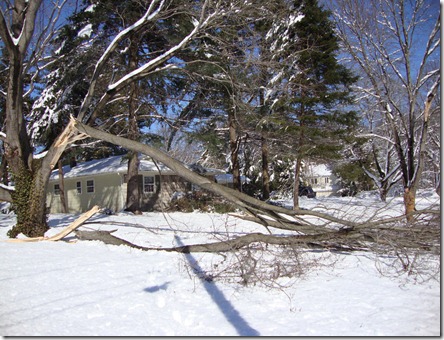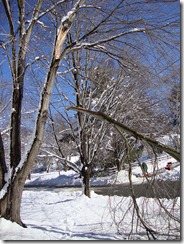 Right as I was finishing dinner on Wednesday night, the power went out. The chili was basically done, left to sit on the gas stove and allow the flavors to intermingle. I had started to bake some cornbread which, once I remembered after locating the flashlights and candles, was about half baked. The house has a gas fireplace and we had been through this power loss routine before. We sent out text messages (I did a couple of Twitter updates) and made a few calls to let people in the area know what had happened (and reported it to the utility company), and then put them down to save on our charge. Gathering what we needed into the family room, we hunkered down in front of the fireplace and made the best of it.
Right as I was finishing dinner on Wednesday night, the power went out. The chili was basically done, left to sit on the gas stove and allow the flavors to intermingle. I had started to bake some cornbread which, once I remembered after locating the flashlights and candles, was about half baked. The house has a gas fireplace and we had been through this power loss routine before. We sent out text messages (I did a couple of Twitter updates) and made a few calls to let people in the area know what had happened (and reported it to the utility company), and then put them down to save on our charge. Gathering what we needed into the family room, we hunkered down in front of the fireplace and made the best of it.
Kathy had a book and read for most of the evening (and as it would turn out, most of the night). I had a book as well that I could have gotten, but I was in no mood for reading. I wasn’t really in any mood for doing anything, really; I was just listening to the wind outside. Laying on the couch, with the crackle of the fire, eyes looking out the back window area watching the tree sway in the wind. Shortly after the power went out, we had limbs from trees around the  house breaking off under the weight of the snow and hitting the roof. You wouldn’t hear the crack, just the dull thud as it hit the roof and rolled off. A couple of these whole limbs, perfectly healthy limbs (not a good sign), snapped off at the trunk of the tree. Most rolled off the roof and into the shrubs, squashing them under the weight of branch and snow. I wouldn’t say that I wasn’t worried that one of these branches would fall in such a way that it would smash a window or take out the power lines, but I tried not to let it cross my mind.
house breaking off under the weight of the snow and hitting the roof. You wouldn’t hear the crack, just the dull thud as it hit the roof and rolled off. A couple of these whole limbs, perfectly healthy limbs (not a good sign), snapped off at the trunk of the tree. Most rolled off the roof and into the shrubs, squashing them under the weight of branch and snow. I wouldn’t say that I wasn’t worried that one of these branches would fall in such a way that it would smash a window or take out the power lines, but I tried not to let it cross my mind.
Early in the evening, I went out to shovel a little bit. I wanted to do something and that was the only thing that I could really do. I knew that I wasn’t going to be able to do much or get very far, but I was not ready to simply lay there while this was going on. The driveway of the house is not under and trees, so I was going to stay out in the open and not risk getting hurt or killed by a falling branch or tree. I told Kathy I would knock on the window at regular intervals so that she wouldn’t worry; if it went too long without a knock, she should come check up on me. The eaves on the house are rather wide, so I had a place to duck under to avoid any potential falling debris. I got wrapped out and headed outside to shovel the back walk and anything else I had the strength and energy to do.
Once outside, it was bright in only the way that a winter landscape can be. The dark trees against the cloudy sky made everything stand out as I shoveled my back to the driveway. It was apparent very early on that this was going to be a short trip outside if I wanted to continue to shovel; the heavy wet snow was enough to make any snow removal arduous. I didn’t want to take out the snowblower since there is a lot of driveway under trees and I wasn’t feeling that adventurous. So, in standing under the eaves of the garage, shoveling every now and again, I would listen for the wind to kick up. You could hear it coming through the trees from far away, so I’d stop, watch, and listen.
 Near and far, you could hear the sounds of branches snapping, their popping and crunching coming through the winter air. Some were so close I’d peer through the darkness to see if I locate the source; others were like distant gunshots, their noise taken away by the wind. I did hear one crash close enough to put it a house or two away, but my vantage was blocked. I did go around the edge of the house to check out the limbs that had fallen, to note their location, and to see if there was any visible damage to the house itself. During this period in time, I watched someone try to make their way through a side street, their tires spinning in the sleet and snow mixture that had formed on the road. I don’t know what would possess anyone to leave their home, but it must have been enough to brave the storm.
Near and far, you could hear the sounds of branches snapping, their popping and crunching coming through the winter air. Some were so close I’d peer through the darkness to see if I locate the source; others were like distant gunshots, their noise taken away by the wind. I did hear one crash close enough to put it a house or two away, but my vantage was blocked. I did go around the edge of the house to check out the limbs that had fallen, to note their location, and to see if there was any visible damage to the house itself. During this period in time, I watched someone try to make their way through a side street, their tires spinning in the sleet and snow mixture that had formed on the road. I don’t know what would possess anyone to leave their home, but it must have been enough to brave the storm.
Afterwards, I came back into the house, changed into pajamas, and took the couch that I would be sleeping in that night (pictured below). There, laying on the couch, listening once again to the fire next to me and the storm above me, my situation dawned upon me.
 I had not been so utterly disconnected in a long while. No computer, no text (saving phone charge, just in case), no games, no television, no technology whatsoever. I had no idea what time it was; I couldn’t even remember the date. As I lay there, my mind was still churning but without the usual external stimuli. It was like a party where the noise level suddenly dies down and all but one person shuts up so their voice carries throughout the room. In this case, my mind was the only voice left.
I had not been so utterly disconnected in a long while. No computer, no text (saving phone charge, just in case), no games, no television, no technology whatsoever. I had no idea what time it was; I couldn’t even remember the date. As I lay there, my mind was still churning but without the usual external stimuli. It was like a party where the noise level suddenly dies down and all but one person shuts up so their voice carries throughout the room. In this case, my mind was the only voice left.
And so, as I lay under many layers of blankets, I just let my mind roam.
I can’t really say that I thought of anything deep and profound, but that I didn’t realize how much of my day had some form of technological input. Even when I’m out and about away from the computer screen, I text on a fairly regular basis with a number of different people. It didn’t matter where I was, there was always a level of connectedness that was present. With the power loss and a driveway full of snow, it was gone. It was a disconnect that I hadn’t experienced in years. (As I write about it now, I think it might have been when I was riding around Australia on my own back in college.)
And so it was, staring at the ceiling and watching the flickering of the fireplace light on the ceiling, almost a passenger in my own brain. With the outside idea support structures away, it was left to its own devices. Scenes from my life, work at the library, friends new and old, just wandered in and out as the night stretched on. I have no idea how long this went on; I know Kathy told me I dozed off several times.
As much as I would think to avoid putting a moral or conclusion on this experience, it feels right to say that I need more kind of this time. While it could be at home, the temptations of the household technology make it a harder sell. I should think that, in conjunction with my new year’s resolution to get out of the house and be more social, I should be looking for more opportunities to find places that make such temptations hard if not impossible. I’ve heard of monasteries that rent rooms to people to allow them to come and stay (with devices forbidden), but I’m thinking of some more local nature destinations. Banish the cell phone to the car, go camping or hiking, maybe visit the beach. I’m not completely firm on ideas, but this feels like the right direction.
It’s always interesting to me how the perception of things can change with just a little shift. I guess this was one of those times. And from the looks of it, it was a tiny bit overdue. This past year has put me on the move and perhaps it is time to take another. 😉
(For those interested, here’s the link to all of the snow pictures from the past week.)







